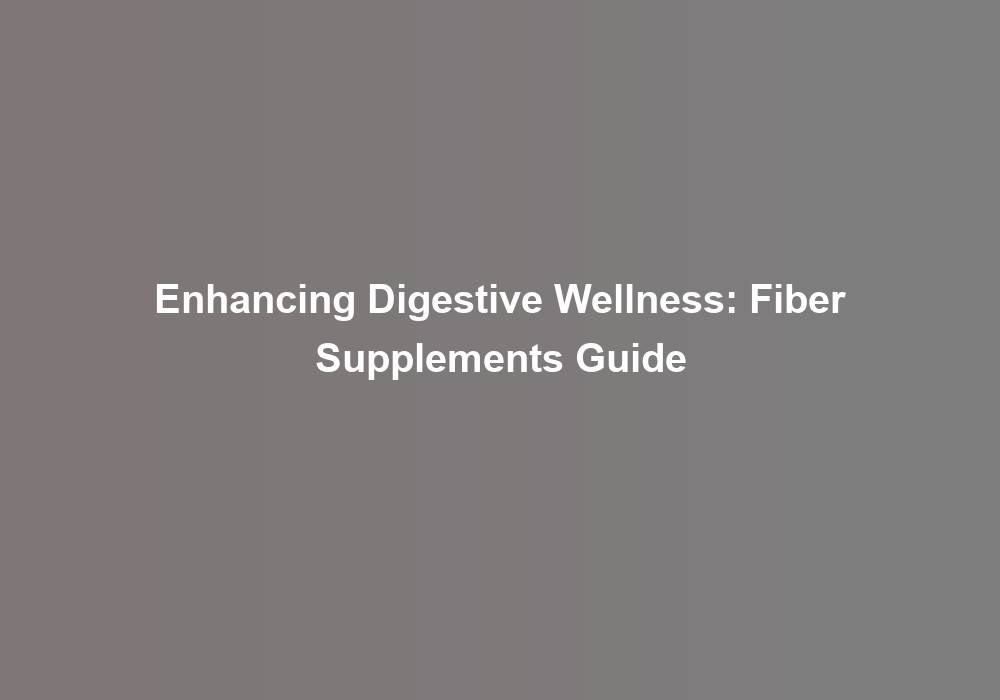Enhancing Digestive Wellness: Fiber Supplements Guide
YouG??ve likely heard the age-old advice to G??eat your fiber,G?? but thereG??s much more to this simple directive than meets the eye. Understanding the intricacies of fiber and its role in digestive wellness can be a game-changer for your overall health. As you navigate the plethora of fiber supplements available, itG??s essential to arm yourself with the knowledge of how to choose the right one and incorporate it into your diet effectively. Whether youG??re seeking relief from digestive woes or aiming to optimize your wellness, this guide will shed light on the world of fiber supplements and empower you to make informed decisions about your digestive health.
Understanding Fiber and Its Role
To understand the role of fiber in your diet, it is important to recognize its impact on your overall health and digestion. Dietary fiber, found in fruits, vegetables, whole grains, and legumes, is crucial for maintaining a healthy digestive system. It aids in preventing constipation by adding bulk to the stool, making it easier to pass through the digestive tract. Additionally, fiber supports the growth of beneficial bacteria in the gut, promoting a healthy balance of microflora and aiding in the prevention of digestive disorders.
Fiber sources are abundant and diverse, allowing for various options to incorporate into your daily meals. Fruits such as apples, berries, and pears, along with vegetables like broccoli, carrots, and spinach, are rich in fiber. Whole grains like oats, quinoa, and brown rice also provide substantial amounts of fiber. Legumes such as lentils, black beans, and chickpeas are excellent sources of both soluble and insoluble fiber, beneficial for overall digestive health.
Furthermore, consuming an adequate amount of fiber has been linked to a reduced risk of developing conditions such as diverticulitis, hemorrhoids, and irritable bowel syndrome. Studies have also shown that high-fiber diets may help lower cholesterol levels and reduce the risk of heart disease. By prioritizing fiber-rich foods in your diet, you are actively supporting your digestive health and overall well-being.
Benefits of Fiber Supplements
Considering the multitude of benefits that fiber provides for your digestive health, incorporating fiber supplements into your daily routine can offer additional support and convenience in meeting your dietary fiber needs. Fiber supplements play a crucial role in promoting gut health and providing digestive support, especially when dietary fiber intake is insufficient. Here are some key benefits of incorporating fiber supplements into your diet:
| Benefits of Fiber Supplements | Description |
|---|---|
| Improved Digestive Health | Fiber supplements can aid in relieving constipation, promoting regular bowel movements, and preventing digestive issues such as diverticulitis. |
| Enhanced Nutrient Absorption | By promoting healthy digestion, fiber supplements can enhance the absorption of essential nutrients, supporting overall well-being. |
| Weight Management | Fiber supplements contribute to a feeling of fullness, which can help control appetite and support weight management efforts. |
| Blood Sugar Regulation | Soluble fiber supplements can assist in regulating blood sugar levels, particularly beneficial for individuals with diabetes or insulin resistance. |
| Heart Health | Fiber supplements, especially soluble fiber, can help lower cholesterol levels and support heart health, reducing the risk of cardiovascular conditions. |
Incorporating fiber supplements into your routine can provide a range of benefits for your digestive wellness, overall health, and well-being. Whether you struggle to meet your daily fiber requirements through diet alone or seek additional support for digestive health, fiber supplements offer a practical and effective solution.
Types of Fiber Supplements
Now, letG??s talk about the different types of fiber supplements. Soluble fiber offers various benefits, such as helping to lower cholesterol levels and regulate blood sugar. On the other hand, insoluble fiber promotes regular bowel movements and can aid in preventing constipation. Understanding the recommended daily intake of fiber can help you choose the right supplement for your needs.
Soluble Fiber Benefits
Soluble fiber supplements, such as psyllium husk or glucomannan, have been shown to provide various health benefits, including improved digestion and heart health. Soluble fiber, found in foods like oats, barley, and fruits, forms a gel-like substance in the gut, which can help regulate bowel movements and alleviate constipation. This type of fiber also acts as a prebiotic, promoting the growth of beneficial gut bacteria, which in turn supports overall digestive health. Furthermore, soluble fiber has been linked to improved heart health by helping to lower cholesterol levels. Consuming soluble fiber supplements, in addition to a healthy diet, may assist in maintaining regular bowel function and supporting heart health. ItG??s important to consult with a healthcare professional to determine the right type and amount of fiber supplement for your individual needs.
Insoluble Fiber Benefits
Insoluble fiber supplements, such as wheat bran or cellulose, can contribute to digestive health by adding bulk to your stool and promoting regular bowel movements. Including these supplements in your diet can aid in improving digestion and preventing constipation. Here are some key benefits and food sources to consider:
-
Benefits of insoluble fiber supplements:
-
Adds bulk to stool, aiding in regular bowel movements
-
Supports a healthy digestive system by promoting regularity
-
Helps prevent constipation by increasing stool bulk
-
Food sources of insoluble fiber:
-
Whole grains such as wheat bran and barley
-
Vegetables like cauliflower, green beans, and potatoes
-
Fruit skins, such as those found on apples and pears
Incorporating these sources of insoluble fiber into your diet can help enhance your digestive wellness.
Recommended Daily Intake
To ensure you are meeting your recommended daily intake of fiber, itG??s important to understand the types of fiber supplements available and their respective benefits for digestive health. The recommended daily fiber intake is 25 grams for women and 38 grams for men. However, most people do not consume enough fiber through dietary sources alone. This is where fiber supplements can play a crucial role in helping you meet your daily fiber intake. Below is a table summarizing the types of fiber supplements and their benefits for digestive health:
| Type of Fiber Supplement | Benefits for Digestive Health |
|---|---|
| Psyllium | Regulates bowel movements, supports heart health |
| Methylcellulose | Helps relieve constipation, promotes regularity |
| Inulin | Acts as a prebiotic, supports healthy gut bacteria |
| Acacia fiber | Aids in digestion, supports bowel regularity |
Understanding the different types of fiber supplements can help you make informed choices to support your digestive wellness.
Choosing the Right Fiber Supplement
When choosing the right fiber supplement, itG??s important to consider the types of fiber available and their benefits for your specific needs. You should also pay attention to the recommended dosage and timing for taking the supplement to ensure optimal results. Understanding these points will help you make an informed decision and select the most suitable fiber supplement for your dietary requirements.
Types of Fiber
Consider carefully selecting a fiber supplement that aligns with your dietary needs and health goals. When choosing the right fiber supplement, itG??s essential to understand the types of fiber available and their sources. Here are some key points to consider:
-
Soluble vs Insoluble Fiber:
-
Soluble fiber dissolves in water and can help lower cholesterol and regulate blood sugar levels.
-
Insoluble fiber adds bulk to the stool and supports regular bowel movements.
-
Fiber Sources:
-
Fruits, vegetables, whole grains, and legumes are excellent natural sources of fiber.
-
Fiber supplements derived from psyllium husk, inulin, or acacia fiber can also provide additional fiber intake.
-
Choosing the Right Source:
-
Consider your dietary preferences and any specific health benefits you aim to achieve when selecting the source of your fiber supplement.
Understanding these distinctions will help you make an informed decision when selecting the right fiber supplement for you.
Dosage and Timing
Selecting the appropriate dosage and timing for your fiber supplement intake is crucial for optimizing its effectiveness. Effective dosages vary depending on individual needs and can range from 5 to 10 grams per day for psyllium-based supplements and up to 30 grams for some other types. ItG??s important to start with a lower dosage and gradually increase it to allow your body to adjust and minimize the risk of digestive discomfort. Optimal timing for taking fiber supplements is typically before meals with a large glass of water to aid absorption and prevent potential interactions with other medications or nutrients. To avoid fiber supplement interactions, itG??s best to take them at least 1-2 hours apart from other medications or supplements. Always consult with a healthcare professional to determine the best practices for your specific needs.
Incorporating Fiber Supplements Into Your Diet
To effectively incorporate fiber supplements into your diet, start by assessing your current dietary fiber intake and identifying areas where supplementation may be beneficial. Here are some practical steps to seamlessly integrate fiber supplements into your daily routine:
-
Evaluate Your Fiber Supplement Options
-
Research various fiber supplement brands to find one that aligns with your dietary preferences and health goals. Look for products that are low in added sugars and artificial ingredients, and consider consulting with a healthcare professional for recommendations tailored to your individual needs.
-
Experiment with Fiber Supplement Recipes
-
Incorporating fiber supplements into your meals can be as simple as blending them into smoothies, mixing them into yogurt or oatmeal, or baking them into homemade energy bars. Experiment with different fiber supplement recipes to find enjoyable and convenient ways to boost your fiber intake.
-
Create a Consistent Routine
-
Integrate fiber supplements into your daily routine by setting specific times to take them, whether itG??s with breakfast, lunch, or dinner. Consistency is key when it comes to reaping the digestive health benefits of fiber supplements, so establishing a regular schedule can help ensure that youG??re getting an adequate intake of dietary fiber.
Potential Side Effects and Precautions
If you experience gas, bloating, or stomach discomfort after incorporating fiber supplements into your diet, it is important to adjust your intake gradually and drink plenty of water to help minimize these potential side effects. Fiber supplements can cause side effects, especially when taken in excess or when your body is not used to them. ItG??s essential to be aware of these potential side effects and take precautions to minimize any discomfort. Here are some dosage considerations, precautions, and potential side effects to keep in mind when using fiber supplements:
| Potential Side Effects and Precautions | Recommendations |
|---|---|
| Gas and Bloating | Start with a low dose and gradually increase intake. Drink plenty of water. |
| Stomach Discomfort | Adjust fiber intake gradually. Ensure you are consuming an adequate amount of water. |
| Fiber Supplement Interactions | Consult with your healthcare provider, especially if you are taking medications, to avoid potential interactions. |
When using fiber supplements, itG??s important to be mindful of any health concerns or risks associated with their usage. If you have any existing digestive issues or medical conditions, it is advisable to consult a healthcare professional before incorporating fiber supplements into your diet. Additionally, be cautious when combining fiber supplements with other medications, as they may interact with certain drugs. By being aware of these precautions and potential side effects, you can effectively manage your fiber supplement intake and promote digestive wellness.
Conclusion
In conclusion, adding fiber supplements to your diet can significantly improve your digestive wellness. In fact, studies have shown that adding just 5-10 grams of fiber per day can lead to a 5-10% decrease in the risk of developing heart disease. With the various types of fiber supplements available, itG??s important to choose the right one for your individual needs and incorporate it into your daily routine for maximum benefits. Take care of your gut health and it will take care of you!







